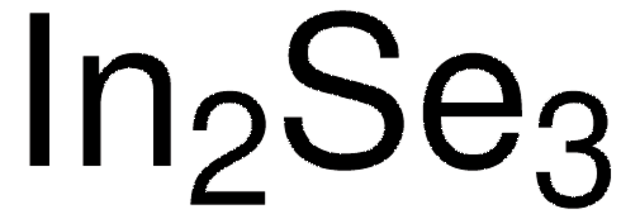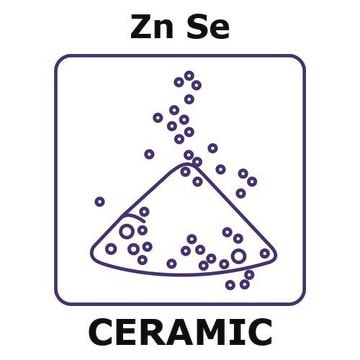244619
Zinc selenide
powder, 10 μm, 99.99% trace metals basis
Sign Into View Organizational & Contract Pricing
All Photos(2)
About This Item
Linear Formula:
ZnSe
CAS Number:
Molecular Weight:
144.35
EC Number:
MDL number:
UNSPSC Code:
12352300
PubChem Substance ID:
NACRES:
NA.23
Recommended Products
grade
deposition grade
Quality Level
Assay
99.99% trace metals basis
form
powder
particle size
10 μm
density
5.42 g/mL at 25 °C (lit.)
application(s)
battery manufacturing
SMILES string
[Zn]=[Se]
InChI
1S/Se.Zn
InChI key
SBIBMFFZSBJNJF-UHFFFAOYSA-N
Looking for similar products? Visit Product Comparison Guide
Related Categories
Signal Word
Danger
Hazard Statements
Precautionary Statements
Hazard Classifications
Acute Tox. 3 Inhalation - Acute Tox. 3 Oral - Aquatic Acute 1 - Aquatic Chronic 1 - STOT RE 2
Storage Class Code
6.1B - Non-combustible acute toxic Cat. 1 and 2 / very toxic hazardous materials
WGK
WGK 3
Flash Point(F)
Not applicable
Flash Point(C)
Not applicable
Personal Protective Equipment
dust mask type N95 (US), Eyeshields, Gloves
Choose from one of the most recent versions:
Already Own This Product?
Find documentation for the products that you have recently purchased in the Document Library.
Customers Also Viewed
Evgeni Sorokin et al.
Optics express, 20(27), 28947-28952 (2012-12-25)
We report self-starting femtosecond operation of a 180-MHz SESAM-controlled prismless Cr:ZnS laser around 2400 nm at open air and room temperature. Dispersion compensation was achieved by a combination of bulk materials and chirped mirrors. Both soliton- and chirped-pulse operation regimes
Damian W Synnott et al.
Nanotechnology, 24(4), 045704-045704 (2013-01-10)
A novel ambient pressure microwave assisted technique is developed in which silver and indium-modified ZnS is synthesized. The as-prepared ZnS is characterized by x-ray diffraction, UV-vis spectroscopy, x-ray photoelectron spectroscopy and luminescence spectroscopy. This procedure produced crystalline materials with particle
Jun Wang et al.
Biosensors & bioelectronics, 41, 143-149 (2012-09-11)
The fluorescence emission intensity of ZnSe quantum dots (QDs) conjugated to proteins to form QD-based biomolecular sensors increases significantly upon binding of the sensors to target proteins in solution. This phenomenon enables the development of homogeneous, separation-free immunoassays for rapid
Hyunchul Jung et al.
Journal of nanoscience and nanotechnology, 12(7), 5407-5411 (2012-09-13)
White light-emitting diodes (LEDs) were fabricated using GaN-based 380-nm UV LEDs precoated with the composite of blue-emitting polymer (poly[(9,9-dihexylfluorenyl-2,7-diyl)-alt-co-(2-methoxy-5-{2-ethylhexyloxy)-1 ,4-phenylene)]), yellow green-emitting polymer (poly[(9,9-dioctylfluorenyl-2,7-diyl)-co-(1,4-benzo-{2,1',3}-thiadiazole)]), and 605-nm red-emitting quantum dots (QDs). CdSe cores were obtained by solvothermal route using CdO, Se
Meng-Yu Chen et al.
Nanoscale, 5(1), 363-368 (2012-11-23)
A novel one-step cation exchange approach has been developed to prepare ZnO-decorated ZnSe nanorods (ZnSe-ZnO NRs), a prototype type-II semiconductor nanoheterostructure. Because of the staggered band offset which promoted effective charge separation, the as-synthesized ZnSe-ZnO NRs exhibited remarkable photocatalytic activities
Our team of scientists has experience in all areas of research including Life Science, Material Science, Chemical Synthesis, Chromatography, Analytical and many others.
Contact Technical Service













![[6,6]-Phenyl C61 butyric acid methyl ester ≥99%](/deepweb/assets/sigmaaldrich/product/structures/359/221/d990c746-0960-4c69-bf76-fe09b193824d/640/d990c746-0960-4c69-bf76-fe09b193824d.png)

